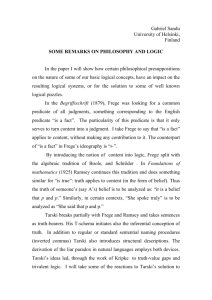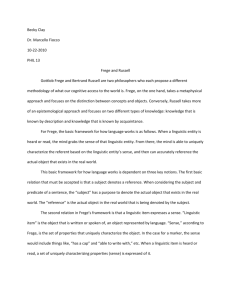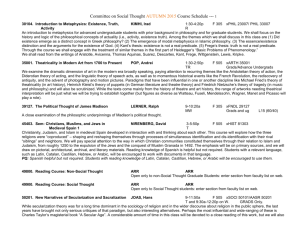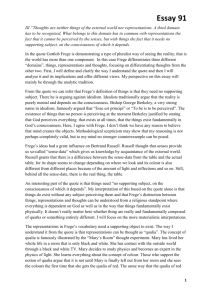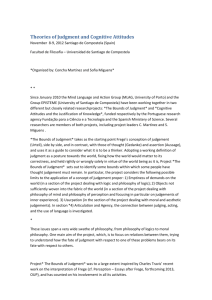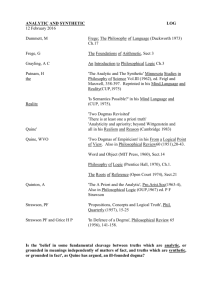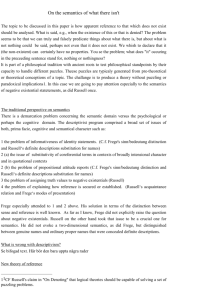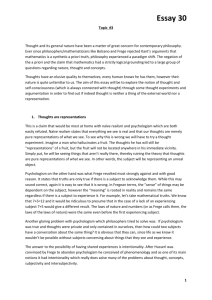G. Frege and Analytic Philosophy
advertisement
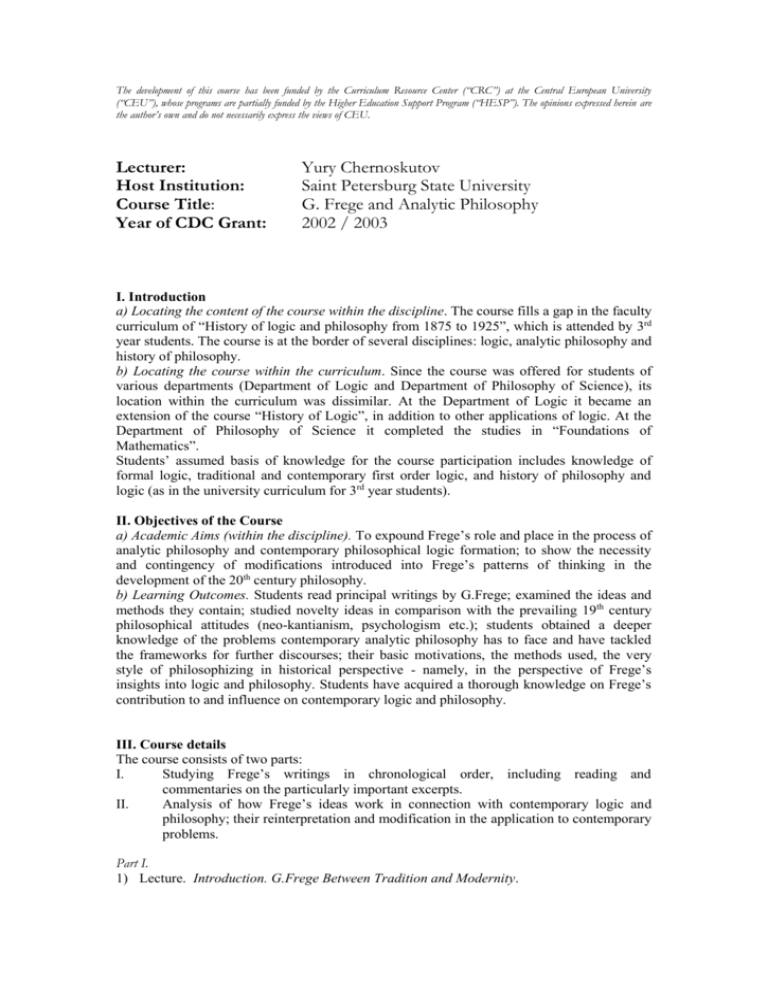
The development of this course has been funded by the Curriculum Resource Center (“CRC”) at the Central European University (“CEU”), whose programs are partially funded by the Higher Education Support Program (“HESP”). The opinions expressed herein are the author’s own and do not necessarily express the views of CEU. Lecturer: Host Institution: Course Title: Year of CDC Grant: Yury Chernoskutov Saint Petersburg State University G. Frege and Analytic Philosophy 2002 / 2003 I. Introduction a) Locating the content of the course within the discipline. The course fills a gap in the faculty curriculum of “History of logic and philosophy from 1875 to 1925”, which is attended by 3rd year students. The course is at the border of several disciplines: logic, analytic philosophy and history of philosophy. b) Locating the course within the curriculum. Since the course was offered for students of various departments (Department of Logic and Department of Philosophy of Science), its location within the curriculum was dissimilar. At the Department of Logic it became an extension of the course “History of Logic”, in addition to other applications of logic. At the Department of Philosophy of Science it completed the studies in “Foundations of Mathematics”. Students’ assumed basis of knowledge for the course participation includes knowledge of formal logic, traditional and contemporary first order logic, and history of philosophy and logic (as in the university curriculum for 3rd year students). II. Objectives of the Course a) Academic Aims (within the discipline). To expound Frege’s role and place in the process of analytic philosophy and contemporary philosophical logic formation; to show the necessity and contingency of modifications introduced into Frege’s patterns of thinking in the development of the 20th century philosophy. b) Learning Outcomes. Students read principal writings by G.Frege; examined the ideas and methods they contain; studied novelty ideas in comparison with the prevailing 19th century philosophical attitudes (neo-kantianism, psychologism etc.); students obtained a deeper knowledge of the problems contemporary analytic philosophy has to face and have tackled the frameworks for further discourses; their basic motivations, the methods used, the very style of philosophizing in historical perspective - namely, in the perspective of Frege’s insights into logic and philosophy. Students have acquired a thorough knowledge on Frege’s contribution to and influence on contemporary logic and philosophy. III. Course details The course consists of two parts: I. Studying Frege’s writings in chronological order, including reading and commentaries on the particularly important excerpts. II. Analysis of how Frege’s ideas work in connection with contemporary logic and philosophy; their reinterpretation and modification in the application to contemporary problems. Part I. 1) Lecture. Introduction. G.Frege Between Tradition and Modernity. Aims: To outline the historical context of Frege’s work, to analyze the novelty of his ideas, to grasp and interpret his principal ideas at different periods of contemporary logic and philosophy development; to provide basic and supplementary bibliography. Content: Frege’s biography and principal writings; general description of the state of affairs in logic, and foundations of mathematics in the period starting with Kant up until the 1870s. The idea of logicism; the particularity of Frege’s logicism; the means of realizing the project. The problem of Frege’s philosophical presumptions as to reconstructing. 2) Reading and commentary. G.Frege. Begriffsschrift (Concept-script). Aims: To examine the principal ideas of Begriffsschrift, especially Frege’s formal system in relation to methods and approaches prevailing today. Content: Commentaries on the principal excerpts from Begriffsschrift, analyzing its formal derivations and informal elucidations. 3) Reading and commentary. G.Frege. Grundlagen der Arithmetik (Foundations of Arithmetics). Chapters I-III. Stating the nature of numbers. Aims: To examine the principal ideas of the first three chapters of Grundlagen der Arithmetik; Frege’s views on the nature of the natural number; the principal aspects and roots of his disagreement with Mill, Kant and others. To conceive the essence of the three methodological principles in the introduction of the book. Content: Commentaries on the principal excerpts from chapters I-III of Grundlagen der Arithmetik. 4) Reading and commentary. G.Frege. Grundlagen der Arithmetik. Chapter IV. The definition of numbers. Aims: To study the “sense” and the line of reasoning that leads to Frege’s definition of the natural number. Content: Commentaries on the principal excerpts from chapter IV of Grundlagen der Arithmetik. 5) Reading and commentary. Papers of 1891-1892, especially Sinn und Bedeutung (Sense and Denotation). Aims: To examine the novelties and refinements introduced by Frege into his doctrine compared to his early views, in Ueber Sinn und Bedeutung, Funktion und Begriff, Ueber Begriff und Gegenstand; their motivations and results. Content: Commentaries on the principal excerpts from the above-mentioned papers. 6) Reading and commentary. Grundgesetze der Arithmetik (Basic Laws of Arithmetics). Aims: To study the principal features of Frege’s system final variant; to unfold the causes leading to a paradox with special attention to his basic “Law V”. Content: Commentaries on the principal excerpts from Grundgesetze der Arithmetik; analyzing the formal derivations. 7) Reading and commentary. Posthumous writings of 1890s and 1900s Aim: To examine Frege’s views on logic, its nature, structure and interrelationships with mathematics, language, philosophy, epistemology; to study his foundational views in general. Content: Commentaries on Frege’s works dating from the above-mentioned period. 8) Reading and commentary. Late works, 1918-1924. Aim: To examine the essence of the “three realms” doctrine, its role and place, and the final formulation of Frege’s views on epistemology; to study his methods of logical analysis of the natural language expressions. Content: Commentaries on the principal excerpts from Logische Untersuchungen and his correspondence. Part II. 9) Lecture. From theories of formal language to formal theories of natural language. Aim: To trace the development of the idea of formal language and the formal methods of analysis from Frege to Montague. Content: Comparison of Frege’s idea of language for pure thought and Russel’s idea of logical analysis. Further development in the Vienna circle doctrine on the language of science. Formal methods of natural language: outline of the idea, motivation, results. 10) Seminar. Logics: calculus and/or language. Aim: To outline the difference between the two principal ways of understanding the foundations and the scope of logic (1840s-1930s). Content: Logic as calculus in the works of logical algebraists (Boole, Jevons, Schroeder). Frege’s objections to the lack of content. Husserl’s views. Why logic, as Frege and Wittgenstein saw it, excluded the possibility of model theory semantics? 11) Lecture. Sense and denotation, description, extension and intention Aim: To trace the history of discussions as raised by Frege’s dichotomy of sense and denotation. Content. Summary of the ways Frege’s ideas were revised, modified and adapted to new applications by B.Russell, R.Carnap, W.V.Quine, S.Kripke et al. 12) Lecture. Some recent accounts for “sense and denotation” and the related puzzles. Aim: To describe recent interpretations of the sense and denotation dichotomy by means of contemporary formal devices. Content: Reconstruction of “sense and denotation” as an algorythm and value by Y.Moschovakis. Frege’s puzzle using the logic of belief as revised by R.Parikh. 13) Seminar. Semantics, metalogics and philosophy. Aim: To compare Frege’ bi-component semantics (i.e. distinction of sense and denotation) with alternative approaches. Content: The basic principles of model-theoretical, possible-worlds semantics; examination of their motivation, formal properties, productivity, philosophical presuppositions and consequences. 14) Lecture. The principle of context and the principle of compositionality. Aim: To establish the role and place of the principle of context and the principle of compositionality in Frege’s logic and logicism, and in current investigations of formal theories. Content: Formulation of the context principle in “Foundations of Arithmetics”, and its functions in Frege’s reasoning. The principle of compositionality – properly Fregean or ascribed to him by R.Carnap, D.Davidson et al.? The collision of these two principles in current inquiries. 15) Seminar. G. Frege and the analytic philosophy. Aim: To summarize the knowledge gained in the context of analytic philosophy genesis and development. Content: A sketch of basic tenets of analytic philosophy and of history of their constitution. Examination of the correspondence on Frege’s attitudes spirit. The principal question of the seminar – in what sense Frege might be regarded as father-founder of analytic philosophy? Topics of reports, which will be proposed for the seminar would present polemic views of different authors on the problem. 16) Research papers defense. IV. Assessment The assessment was a combination of the following values: In-class activity (including participation, reviews and questions) - 30 %; Reports - 30 % Final research paper - 40 % V. Reading list Class 1 Бирюков Б.В. Готтлоб Фреге: современный взгляд. В: Г.Фреге. Логика и логическая семантика. М., 2001 Kenny A.J. Frege: An Introduction to the Founder of Modern Analytic Philosophy. Blackwell, 2000 Class 2 Фреге Г. Запись в понятиях. В: Г.Фреге. Логика и логическая семантика. М., 2001 Class 3 Фреге Г. Основоположения арифметики. Томск, 2000, гл. 1-3 G.Frege. Foundations of Arithmetics. Tr. by J.Austin. (with parallel German and English texts). Oxford, 1953. Class 4 Фреге Г. Основоположения арифметики. Томск, 2000, гл.4 G.Frege. Foundations of Arithmetics. Tr. by J.Austin. (with parallel German and English texts). Oxford, 1953. Class 5 Готтлоб Фреге. Логика и логическая семантика. М., 2001, часть вторая. Логическая семантика Class 6 G.Frege. Basic Laws of Arithmetics. Berkeley, 1964 Translations from the Philosophical Writings of Gottlob Frege? Eds. P.Geach and Max Black, 3rd ed., Blackwell, 1980. Class 7 Готтлоб Фреге. Логика и логическая семантика. М., 2001, часть третья. Логические исследования. G.Frege. Schriften zur Logik. Aus dem Nachlass. Berlin, 1973 Class 8 Готтлоб Фреге. Логика и логическая семантика. М., 2001, часть третья. Логические исследования. Фреге Г. Логические исследования. Томск, 1997. Class 9 Бертран Расселл. Введение в математическую философию. М., 1996. Семантика модальных и интенсиональных логик. М., 1981 Montague R. Formal Philosophy. New Haven, 1974 Class 10 Г. Фреге. Булева вычислительная логика и мое исчисление понятий. В: Готтлоб Фреге. Логика и логическая семантика. М., 2001 Hintikka J. Revolt against Frege // Flistad (ed.) Contemporary Philosophy, v.1, Hague, 1981. Mohanty J.N. Husserl and Frege. Bloomington, 1982. Class 11 Russel B. On Denoting // Mind, v.14, 1905 Карнап Р. Значение и необходимость. М., 1956 Church A. A formulation of the logic of sense and denotation // Henle E. et al. (eds.) Structure, method and meaning. N.Y., 1951. Kneale W, Kneale M. Development of Logic. Oxford, 1963. Class 12 Moschovakis Y. Sense ad denotation as algorithm and value // Proc. of Logic Colloqium ’90, Helsinki. Parikh R.Propositions, propositional attitudes and belief revision. in Advances in Modal Logic, Volume 2, K. Segerberg, M. Zakharyaschev, M. de Rijke, H. Wansing, editors, CSLI Publications, 2000. Class 13 Kripke S. Outline of a Theory of Truth. The Journal of Philosophy, v.72, 1975. M.B.Hintikka, J.Hintikka. Investigating Wittgenstein, Blackwell Publishers, 1989 J. van Hejenoort. Logic as Calculus and Logic as Language, Synthese, v.17, №3, 1967. Class 14 Davidson D. Truth and Meaning // Synthese, v.17, 1976. W.Demopoulos (ed.). Frege’s philosophy of mathematics. Cambridge, Mass., London, 1997. Journal of Logic, Language and Information, v.10, #1, 2001. Special issue on contextuality and compositionality. Class 15 Боброва Л.А. Аналитическая философия в XX веке: итоги и перспективы. В: Философия в ХХ веке. М., 2001 E.H.Reck (ed.) From Frege to Wittgenstein. Perspectives on Early Analytic Philosophy. Oxford, 2002 Dummett M. Interpretation of Frege’s Philosophy. Cambridge (Mass.), 1981 Sluga H. G.Frege. London, 1980. VI. Teaching methodology Since the principal aim of the first part of the course is to introduce Frege’s thought and methods to the students in detail, the most appropriate way of teaching is reading excerpts from Frege’s works, followed by immediate commentaries and the explanation of the puzzling points. The second part consists of a number of lectures devoted to enlightening the key problems posed by G. Frege in the perspective of assimilating and adapting them by the succeeding development of logic and philosophy. Every problem cluster, delivered by lecturing, is followed by a seminar, which is supposed to look at students’ reports and be followed by discussions based on these. The course methodology intends to encourage students in using a comparative style of reports, e.g. “Frege and Husserl on … (certain problem)’, ‘Frege and Russell on …’, ‘Frege and Wittgenstein on…’, etc.
